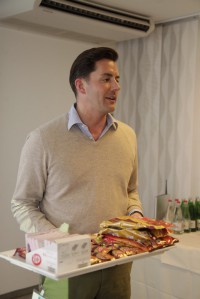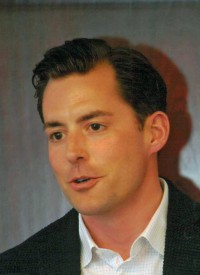Theegarten-Pactec GmbH & Co. KG
"An enormous potential for increasing efficiency"
As a future-oriented development, industry 4.0 is discussed as a term for the fourth industrial revolution after the introduction of the steam and power machines, the changeover to assembly line work and finally information technology. What is really there? An interview with Markus Rustler, Managing Partner of Theegarten-Pactec GmbH & Co. KG.
At the Tessin Innovation Days in Switzerland, Markus Rustler gave a presentation on Industrie 4.0 and the challenges for the confectionery manufacturers as well as for suppliers. sweets processing spoke with the owner of Theegarten-Pactec.
sweets processing: Industry 4.0 is a topic that has constantly been in everyone’s ears for some time now. In your opinion, to what extent is the confectionery industry already tackling this issue?
Markus Rustler: First of all, Industry 4.0 is a marketing catchphrase originally initiated by the German government. It refers to the interconnectivity of industrial processes. A general set of guidelines outlining its objectives has not been provided yet.
There is enormous potential for increasing efficiency in designing production processes in a transparent manner, having constant access to important data, correctly analyzing such data and then determining the correct steps to take on the basis of such analysis. This is how the confectionery industry addresses this issue, as do probably all industries.
sp: What level of priority does this topic have in your company?
MR: Our R&D work is of course focused on improving the efficiency, quality and flexibility of our products. In mechanical engineering, this focus is manifested in the classic sense through new mechanical concepts or new materials that push back the borders of physical limitations. But the constant improvement seen in communication between people and machines or machines and machines is also a cornerstone in the increased efficiency, quality and flexibility of our machinery. This has already been an issue at Theegarten-Pactec for years – also before the heralding of Industry 4.0.
sp: Have you already initiated projects in this direction?
MR: We already began overhauling our user interface and the associated data preparation for the operators and for management back in 2011, thereby creating a platform making the performance of our systems more transparent. For example, the correlations between efficiency losses and time, the surrounding temperature or other parameters can be set, providing support for error searches and assistance for self-help. Of course, as part of this process we have also optimized the intuitive support of the maintenance and cleaning processes – for example, with active service and maintenance interval reminders from the machine itself.
Expanding automation has linked our machinery into complex systems which can be operated by fewer operators, in some cases even only one. We support this multi-machine operation by integrating the user interface into mobile consumer devices. And of course, this allows the data from the machinery to be accessed and even edited from anywhere in the world.
“We permanently have to confront and evaluate these topics”
sp: There is a great deal of debate about the “revolution” facilitated by innovative processes and new types of technologies for an ever-more dynamic market, and there are many ideas and concepts out there. But despite all this, it doesn’t seem as if the direction is quite so clear yet. How do you see the current state of things in this regard?
MR: I see it exactly the same way. It is important to distinguish between what’s ridiculous and what makes practical sense. Many of the ideas being discussed would certainly be nice to have, but they turn out to be useless under closer scrutiny. Nevertheless, as an innovative company we permanently have to confront and evaluate these topics.
sp: Are there already uniform standards and interfaces on the horizon for the new industrial world?
MR: I think there are attempts to define standards on a variety of different points. But at the end of the day each company has to decide what makes sense and what doesn’t. From my perspective, the important thing is that the industry itself sets the “standards”, not some group of IT companies like we’ve seen in other industries.
sp: What effects will the further development of Industry 4.0 factories have for company management as well as for employees and people in general?
MR: This question also depends on the definition of Industry 4.0. Fundamentally, greater interconnectivity can result in faster processes and increased efficiency. I’m repeating myself here – where it makes sense. Executive management personnel and employees of industrial companies are constantly confronted with new technologies and they have to decide which options produce added value.
sp: At present it’s primarily the research departments at large corporations that are working intensively on the big visionary projects. Are mid-sized companies really prepared for this “revolution” in terms of personnel and financing?
MR: It’s hard to generalize about that, but mid-sized companies like Theegarten-Pactec that are focused on their particular niches as technological leaders have always invested in research & development. So I don’t really see any problems for us in that regard. It’s true that the budget won’t be as big as the ones at large corporations, but that probably makes us look closer at precisely which area of development ultimately makes the most sense and best serves the client.
sp: With an export share in excess of 90 % and branch operations in over 100 countries, Theegarten-Pactec maintains a close proximity to its customers even today. Is the competitive pressure on the company resulting from digitalisation and interconnectivity set to increase, or does Industry 4.0 offer even more opportunities?
MR: The competitive pressure is, was and will remain high – we don’t anticipate any changes in that regard. Instead, we see the digitalisation and interconnectivity of the added value chain as components in the further development of our packaging systems.
“It’s no secret that the questionof the security of such data and the networks keeps the company’s IT personnel up at night.”
sp: One central point is the interlinking of all the market participants along the added value chain and the collection of big data in the clouds. Do you see this as appropriate and compatible for the future? And what risks do you think it involves?
MR: As the question itself reveals, the collection and preparation of data that can serve as a basis for decision-making and action is an elementary aim of Industry 4.0. And it’s no secret that the question of the security of such data and the networks keeps the company’s IT personnel up at night. Time will tell whether customers are willing to open up regarding the transfer of data if it gives them an efficiency advantage.
sp: Billions have been invested in IT and communication technologies in recent years, and these fields are continually demanding ever greater prioritisation in the overall transaction of business. Will the production-oriented business model eventually lose its decisive influence?
MR: I don’t believe so. Data processing is ultimately just a tool that can provide or support a particular benefit. Data alone – regardless of how well it’s prepared – still can’t build a machine or package a chocolate bar.
sp: Individualisation, flexibility, rapid changes to products and services – these trends are also becoming more prevalent in the confectionary industry. How can brand manufacturers react to this? And how can the supplier industry, including mechanical engineering, support large concerns and mid-sized companies in this transformation?
MR: The confectionary industry has always been characterized by the constant development of new products, deriving new products from existing ones and the production of seasonal products. In addition, we can observe a trend toward shorter product life cycles.
As a packaging mechanical engineering firm, Theegarten-Pactec can support confectionary manufacturers by developing increasingly flexible machinery that accommodate the dimensions of the products to be packaged and the conversion into different wrapping types. We’re working on this without neglecting the high output and efficiency of the machinery that are essential for the production of FMCG.
sp: Mr. Rustler, thank you very much for the interview.




